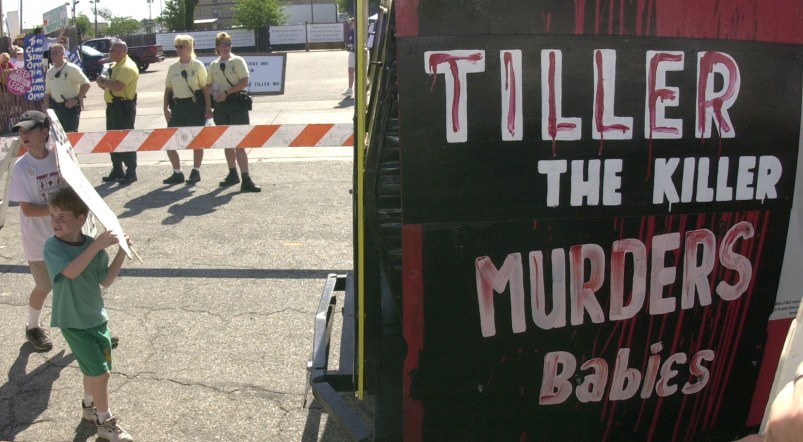“They’re going to walk right up and shoot you in the head.” Six years after the murder of Dr. George Tiller at his church in Wichita, Kansas, this is what one abortion provider believes every day as she watches extremists stalk her at work, at home and in her community.
On Sunday morning May 31, 2009, Dr. George Tiller was assassinated while serving as a church usher. Scott Roeder, who had previously stalked him to learn his day-to-day routine, shot him point-blank for a single reason: Dr. Tiller was an abortion provider. As we commemorated the six-year anniversary of this horrific incident of domestic terrorism on Sunday, it is important to understand how Dr. Tiller’s death continues to haunt the lives of abortion providers—and inspire the extremists who still target them.
Dr. Tiller’s assassination is not the only one of its kind in the United States; it is just the most recent. Starting in 1993, eight abortion providers around the country have been murdered because of their profession—four doctors, two receptionists, a security guard, and a clinic volunteer.
The first six of these providers were murdered while working; the seventh while preparing dinner in his kitchen; and the eighth, Dr. Tiller, was murdered in church. This progression of extreme violence demonstrates that abortion providers are at risk not only where they work, but in personal and social spaces as well. This pattern sends a terrifying message: providers are not safe anywhere, whether at work, at home, or in their community.
Based on four years of interviews that we conducted for our new book, we know that these murders, and in particular Dr. Tiller’s, continue to resonate in the day-to-day harassment that abortion providers face, even six years later.
For instance, the director of several clinics in the South mentioned above, who endures abortion opponents stalking her, sending her hate mail, taunting her kids and employees, and lining her commute to work with signs displaying the clinic doctor’s picture in a large bulls-eye, has had a difficult time dealing with Dr. Tiller’s murder. “I think it’s hard to think that could happen to you,” she told us. “That was tough.” As a result of this violence, she now has a bulletproof vest that she wears for safety. She’s not sure though whether the vest will actually make a difference. Like many others we talked with, she said, alluding to Dr. Tiller’s murder, a vest has limited utility when an extremist is pointing a gun at your head.
A doctor in a Midwest state described how his life has changed in the wake of Dr. Tiller’s assassination. Abortion opponents regularly picket his home and occasionally picket his church, just like Dr. Tiller. Because of Dr. Tiller’s murder, he and his clinic now use clandestine tactics, involving disguises and hidden entrances, to enter and exit the building. Another provider, a volunteer in a different Midwest state, similarly explained her day-to-day life since Dr. Tiller’s murder. “Where I work is a sniper’s paradise because there are all these little places that people could stand. Every single time I get out of my car I do this thing where I look around to see who is there. It’s something that I’ve had to do.”
Anti-abortion extremists are also still capitalizing on Dr. Tiller’s murder. At a recent demonstration in front of a Midwest provider’s house, one of the picketers held a sign saying “Where’s your church?” The sign’s message was clear: “Dr. Tiller was murdered in his church,” she explained to us. “So I took that as a direct death threat.”
These concerns would be foreign to the lives of other medical care providers in the United States; however, for abortion providers, because of murders like Dr. Tiller’s, this fear can be an everyday part of their existence.
Abortion providers, however, are not backing down. Even in the face of Dr. Tiller’s assassination and other acts of targeted harassment and terrorism, providers continue to help women. As they explained to us, they are aware of the risk in their profession as well as what exactly Dr. Tiller’s murder means. But, they also know that, as one doctor put it reflecting on Dr. Tiller’s murder, they are going to continue “because this is really important.” Or, as several others proclaimed, they aren’t going to let the terrorists win.
David S. Cohen is a law professor at Drexel University Thomas R. Kline School of Law, where he teaches constitutional law and gender and the law. Prior to teaching, Cohen was a staff attorney at the Women’s Law Project in Philadelphia and litigated cases involving abortion clinic safety, reproductive rights, Title IX, and LGBT family law.
Krysten Connon is a 2012 graduate of the Drexel University School of Law. Following law school, Connon worked as a federal judicial law clerk. She is currently an attorney in private practice in Philadelphia.







Domestic terrorists, egged on by Bill O’Reilly.